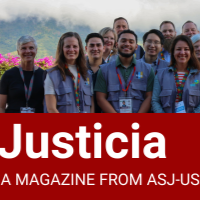Jaime was initially skeptical. Even if ASJ was able to provide the resources that the National Police were sorely lacking, it was almost impossible to get a conviction without eyewitness testimony.
“We know that,” he remembers the ASJ lawyer saying, “We also have witnesses.”
In a few months of work, ASJ had managed to do what for the police was nearly impossible – gain the trust of victims and witnesses of crime and convince them to testify in court. Later that year, with ASJ’s support and the witnesses they brought, Jaime and his team would win one of their biggest victories in years, the arrest of men who had been terrorizing the community where ASJ founders Carlos Hernández and Kurt Ver Beek lived. The arrest would be the first of many.
“After that first partnership, I saw that everything they had told me was true,” says Jaime, “We didn’t have witnesses, and they brought the witnesses to us. They had access to the community.”
Over the years, Jaime moved up in the police force, eventually reaching the position of Chief of Homicides for Tegucigalpa. In a police force riddled with corruption and inefficiencies, he was an honest, model officer. International organizations sent him to Guatemala, El Salvador, and the United States to receive special investigative training. But in the National Police, he found it difficult to fully implement this training.
On a typical morning, he would be greeted in his office by a stack of files a few inches high – each sheet of paper a different murder that had to be investigated.
Jaime would work his way through the stack, assigning each case to an investigator. As he reviewed the cases, he says,
“I didn’t even look at the names. I didn’t know if they were rich or poor, to me, each case was just another number.”
Overwhelmed by the number and difficulty of cases, he continued to rely on his relationship with the ASJ Peace and Justice Project.
“When we heard of a homicide in one of ASJ’s communities, it was enough to just pick up the phone, and we knew they would take on the case and they would do it well” says Jaime. “We had a lot of trust in them.”
Peace and Justice didn’t just offer technical assistant, they also provided resources that the police didn’t have – basic resources like vehicles to drive into communities, cell phones to call witnesses, printers to print arrest warrants.
“I remember in the police we had so few resources that when we delivered case files to the court in a manila folder we would ask for them to return the folders to us so we could reuse them,” says Jaime.
Even simple office supplies were scarce, he says: “Pencils, pens, notebooks, all of that we had to buy ourselves.”
In early 2014, after 20 years in the police force, and over a dozen transfers and job changes, Jaime made one of his biggest transitions yet. After years of working alongside ASJ’s Peace and Justice Project, Jaime became its newest member.
Jaime began at Peace and Justice not as an investigator but as a lawyer – studying on the evenings and weekends, he had earned a law degree while still in the police force. His decades of experience in police investigation helped him argue cases in court that for others would have been too difficult or technical. Along with his team of an investigator and a psychologist, he started to see from the inside the success that he had so long admired from the outside.
He was shocked by how different the environment at ASJ was from any office he had ever worked in before.
On his first day, he remembers, he could hardly believe that his new desk neatly stocked with all the office supplies he needed.
The working environment was different as well. While in the police Jaime had assigned cases without even glancing at names, with Peace and Justice he came to know the cases, and their victims, intimately.
He and his colleagues would drive witnesses and families of victims to and from court, to and from therapy, and listen to their grief and fear. Cases that before had been no more than numbers became faces, became stories.
Jaime, who had always been motivated by his faith to do what was right, began to see the broader reaches of justice.
In the hard environment of the police department he had been cynical, skeptical, and mistrusting. With Peace and Justice he began to warm up to people, expressing compassion towards people in communities that for the first time felt like his brothers and his sisters.
Jaime remembers a woman once told his team, crying, “You are angels sent by God to help me.”
“That is the best praise we can get,” he says, “To feel that personal commitment and the satisfaction of being able to help.”
In 2017, Jaime became the coordinator of the Peace and Justice project, where he supervises six teams in two different cities. The bold, successful work of Peace and Justice has earned Jaime recognition, but what he most values is the knowledge that he is making a difference in the lives of some of Honduras’ poorest and most deserving people.
“I had many victories in my years with the police,” Jaime says, “I earned medals and diplomas, I received many awards. But I don’t remember a single victim or witness ever thanking me for my work. With Peace and Justice, that has become the most important prize I could receive. I would rather receive the gratitude of one family than all the awards in the world.”

















